
The UEFA Champions League is an annual club association football competition organised by the Union of European Football Associations (UEFA) that is contested by top-division European clubs. The competition begins with a round robin league phase to qualify for the double-legged knockout rounds, and a single-leg final. It is the most-watched club competition in the world and the third most-watched football competition overall, behind only the UEFA European Championship and the FIFA World Cup. It is one of the most prestigious football tournaments in the world and the most prestigious club competition in European football, played by the national league champions of their national associations.
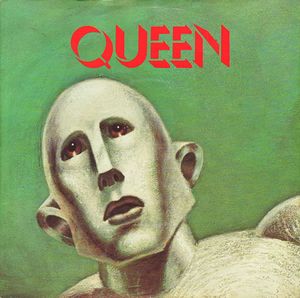
"We Are the Champions" is a song by the British rock band Queen, released from the band's sixth album News of the World (1977). Written by lead singer Freddie Mercury, it remains among rock's most recognisable anthems. The song was a worldwide success, reaching number two in the UK, number four on the Billboard Hot 100 in the US, number three in Canada, and the top ten in many other countries. In 2009, it was inducted into the Grammy Hall of Fame and was voted the world's favourite song in a 2005 Sony Ericsson world music poll.

"Revolution" is a song by the English rock band the Beatles, written by John Lennon and credited to the Lennon–McCartney partnership. Three versions of the song were recorded and released in 1968, all during sessions for the Beatles' self-titled double album, also known as the "White Album": a slow, bluesy arrangement included on the album; an abstract sound collage that originated as the latter part of "Revolution 1" and appears on the same album; and the faster, hard rock version similar to "Revolution 1", released as the B-side of "Hey Jude". Although the single version was issued first, it was recorded several weeks after "Revolution 1", intended for release as a single. A music video for the song was shot using the backing track from the single version, their appearances reflecting the song's atmosphere, along with live-sung lyrics that more closely resemble the album version.
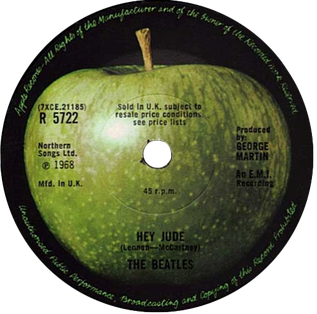
"Hey Jude" is a song by the English rock band the Beatles that was released as a non-album single in August 1968. It was written by Paul McCartney and credited to the Lennon–McCartney partnership. The single was the Beatles' first release on their Apple record label and one of the "First Four" singles by Apple's roster of artists, marking the label's public launch. "Hey Jude" was a number-one hit in many countries around the world and became the year's top-selling single in the UK, the US, Australia and Canada. Its nine-week run at number one on the Billboard Hot 100 tied the all-time record in 1968 for the longest run at the top of the US charts, a record it held for nine years. It has sold approximately eight million copies and is frequently included on music critics' lists of the greatest songs of all time.

Gerry and the Pacemakers were an English beat group prominent in the 1960s Merseybeat scene. In common with the Beatles, they came from Liverpool, were managed by Brian Epstein and recorded by George Martin. Their early successes helped make popular the Merseybeat sound and launch the wider British beat boom of the mid-1960s

The Club is a satirical film based on the play of the same name by the Australian playwright and dramatist David Williamson. It follows the fortunes of an Australian rules football club over the course of a season, and explores the clashes of individuals from within the club. It was inspired by the backroom dealings and antics of the Victorian Football League's Collingwood Football Club.

"You'll Never Walk Alone" is a show tune from the 1945 Rodgers and Hammerstein musical Carousel. In the second act of the musical, Nettie Fowler, the cousin of the protagonist Julie Jordan, sings "You'll Never Walk Alone" to comfort and encourage Julie when her husband, Billy Bigelow, the male lead, stabs himself with a knife whilst trying to run away after attempting a robbery with his mate Jigger and dies in her arms. The song is reprised as an epilogue in the final scene to encourage a graduation class of which Louise Bigelow is a member as the Starkeeper is about to give them a graduation sermon. The now invisible Billy, who has been granted the chance to return to Earth for one day in order to redeem himself, watches the ceremony and at the end of the Starkeeper's homily is able to silently motivate Louise and Julie to join in with the song as the whole congregation unite in singing along with them urged on by the Starkeeper as he ascends to paradise.

A football chant or terrace chant is a form of vocalisation performed by supporters of association football, typically during football matches. Football chanting is an expression of collective identity, most often used by fans to express their pride in the team they support, or to encourage them, and to celebrate a particular player or manager. Fans may also use football chants to slight the opposition, and many fans sing songs about their club rivals, even when they are not playing them. Sometimes the chants are spontaneous reactions to events on the pitch.

Theme music is a musical composition which is often written specifically for radio programming, television shows, video games, or films and is usually played during the title sequence, opening credits, closing credits, and in some instances at some point during the program. The purpose of a theme song is often similar to that of a leitmotif.
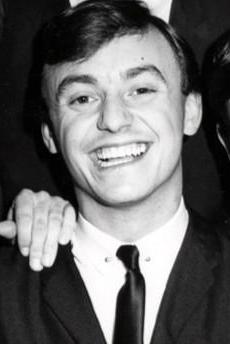
Gerard Marsden MBE was an English singer-songwriter, musician and television personality, best known for being leader of the Merseybeat band Gerry and the Pacemakers. He was the younger brother of fellow band member Freddie Marsden.
The use of music at sporting events is a practice that is thousands of years old, but has recently had a resurgence as a noted phenomenon. Some sports have specific traditions with respect to pieces of music played at particular intervals. Others have made the presentation of music very specific to the team—even to particular players. Music may be used to build the energy of the fans, and music may also be introduced in ways that are less directly connected with the action in a sporting event.
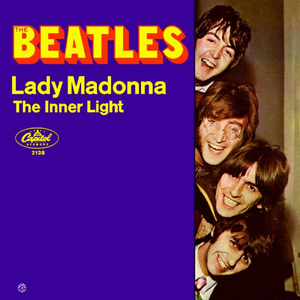
"Lady Madonna" is a song by the English rock band the Beatles, written primarily by Paul McCartney and credited to Lennon–McCartney. In March 1968 it was released as a mono non-album single, backed with "The Inner Light". The song was recorded on 3 and 6 February 1968, before the Beatles left for India, and its boogie-woogie style signalled a more conventional approach to writing and recording for the group following the psychedelic experimentation of the previous two years.
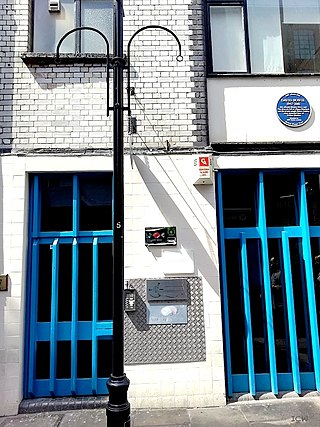
Trident Studios was a British recording facility, located at 17 St Anne's Court in London's Soho district between 1968 and 1981. It was constructed in 1967 by Norman Sheffield, drummer of the 1960s group the Hunters, and his brother Barry.

"Those Were the Days" is a song composed by Boris Fomin (1900–1948) but credited to Gene Raskin, who put a new English lyric to Fomin's Russian romance song "Dorogoi dlinnoyu", with words by the poet Konstantin Podrevsky. The song is a reminiscence of youth and romantic idealism. It also deals with tavern activities, which include drinking, singing, and dancing.
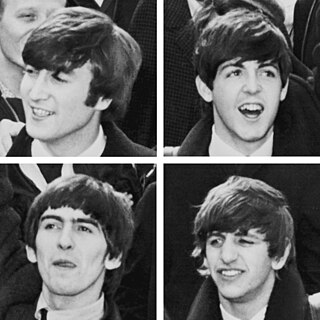
Liverpool has a lengthy tradition of music both classical and pop. It is well known for the Beatles. Its pop and rock music scene has also been important in the development of a number of other bands and artists since the 1950s.
The UEFA Champions League Anthem, officially titled as simply the "Champions League", is the official anthem of the UEFA Champions League, written by English composer Tony Britten in 1992, and based on George Frideric Handel's Zadok the Priest. It was also the official anthem of the UEFA Women's Champions League from its creation in 2001 to the 2021 creation of an independent anthem. The complete anthem is about three minutes long, and has two short verses and the chorus. The lyrics are in UEFA's three official languages: English, French, and German. The chorus is set to the exclamations "Die Meister! Die Besten!Les grandes équipes! The champions!"
"Bro Hymn" is a song by American punk rock band Pennywise. It is the last track on both their 1991 self-titled debut album, and 1997's Full Circle as "Bro Hymn (Tribute)". Its lyrics are about the death of bassist Jason Thirsk's friends Tim Colvin and Carlos Canton, and Tom Nichols.
"This Is Our House" is a song by American rock band Bon Jovi. It was originally written by Jon Bon Jovi, Richie Sambora and Desmond Child and recorded in 2009. Originally intended as an exclusive track for the forthcoming National League Super Bowl season, it became a hit with Bon Jovi fans who asked for it to be including on the band's new hits collection. Greatest Hits had already been pressed to disk and it was too late to include the song of a physical format but it made its debut proper as a bonus track if one downloaded Greatest Hit from the band's website. The song was also released as a bonus track on the iTunes edition of their Greatest Hits collection in the UK and Europe, but was released as a digital single in September 2011. Bon Jovi opened many shows in 2010-2012 with This Is Our House.

"Where Have You Been " is a song written by Barry Mann and Cynthia Weil.

The Lyrics: 1956 to the Present is a book released in November 2021 by the English musician Paul McCartney and the Irish poet Paul Muldoon. It is published by Penguin Books Ltd in the United Kingdom, W.W. Norton/Liveright in the United States of America and C.H. Beck in Germany.














